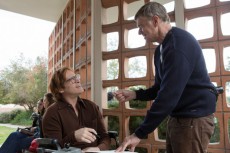”状況を受け入れた時に猛烈な勢いでクリエイティヴな感覚が巻き起こる”Interview with Joaquin Phoenix about “DON’T WORRY, HE WON’T GET FAR ON FOOT” ホアキン・フェニックス『ドント・ウォーリー』インタビュー
NeoL / 2019年5月1日 12時0分
”状況を受け入れた時に猛烈な勢いでクリエイティヴな感覚が巻き起こる”Interview with Joaquin Phoenix about “DON’T WORRY, HE WON’T GET FAR ON FOOT” ホアキン・フェニックス『ドント・ウォーリー』インタビュー
2014年に死去したロビン・ウィリアムズが自身の主演で映画化の構想をあたためていた風刺漫画家ジョン・キャラハンの半生を、ガス・バン・サントがその遺志を継いで脚本を執筆。主演にホアキン・フェニックスを迎え、企画から約20年の時を経て完成させた映画『ドント・ウォーリー』がついに公開される。たとえ人生最悪の困難な時にあっても、人は変わることができる力を秘めているーそう優しく伝えてくれる、希望と生きる力を与えてくれる本作の主演を演じたホアキン・フェニックスのインタビューをお届けする。
―ガス・ヴァン・サント監督が、あなたに初めて『ドント・ウォーリー』について話したのはいつですか?
ホアキン・フェニックス「多分撮影が始まる1年前だったかな。ガスが脚本を送ってきたんだ。僕はこの企画は彼が90年代から数年間かけて改良しているものだと知っていて、映画監督が同じ企画に何度も立ち戻るなんて執念を感じたし、そこにはまだ知られていない何かがあるのかもしれないととても興味を持ったんだ。ジョン・キャラハンが、ガスの個人的な知人であるということはとても重要で、他の監督にはない、キャラクターの人格への洞察力がよりあるのではと思った。でも彼が脚本を送ってくれた時、僕はエージェントと他の企画を話していたし、“伝記映画に出演したくない。全く興味がない”と言ったんだ。それでもガスは脚本を送ってきて、典型的な伝記映画ではないと感じたし、ジョンを演じることを通してこれは面白い体験ができるかもと考えた。そして、ガスが話していたアニメーションを映像の中に入れるというのもとても興味深くて、脚本を読んで着実に準備が進んでることを感じられたんだ。台本はどんどん良くなってきて、とても感動した。ガスに“これは本当にすごいよ”と伝えた。脚本のすべてのバージョンがとても面白くて、ジョンのいろいろな人生の部分にフォーカスしていて、各々の欠片が全て集約されたものが出来上がった瞬間、感動したんだ。良い脚本が完成して、映画を作ることを話し始めたんだよ」
――ガスからアプローチがある前にジョン・キャラハンの漫画を知っていましたか?
ホアキン・フェニックス「いや」
――では、いつジョンのことを知りましたか? そして彼のことをどう思いました?
ホアキン・フェニックス「素晴らしいと思った。彼は本当に個性的なハートの持ち主なんだ。彼の本のどこが素晴らしいかというと、彼がどのように1枚のイメージにまとめていくかのか、ギャグの革命をどのように考えているのか、何度も描き直していく、面白いものを作り上げていくというプロセスを読むことができるんだよ」
――When did Gus first talk to you about “Don’t Worry, He Won’t Get Far on Foot”?
Joaquin: It was maybe a year before we started shooting. Gus sent me a script and I knew that it was a project that he had been developing for several years, I think since the 90’s, so anytime a filmmaker keeps coming back to the same project, there’s an obsession there, there’s something they are trying to uncover so that made me really curious. And John was somebody that Gus knew personally, which was really important and I felt that he would have insights into his character that another director might not have. And then he sent the script and I had been talking to my agents about some other projects and I said ‘I don’t want to make a biopic. I’m not really interested in that.’ And then Gus sent the script and it didn't feel like the traditional biopic and so I thought there was a really interesting way into John’s experience. And the animation that Gus was talking about using and playing with seemed really interesting to me so he sent me a script and then he was like ‘I’m working on it.’ And it kept taking on different shapes and there was one point when he sent the script and I was really moved by it. I said ‘Gus I think this is really great.’ Every version of the script was really interesting to me and it focused on a different part of John’s life and there came a moment when all the different pieces came together in one script. And I thought it was really good so we started talking about actually making the movie.
――Did you know John’s work before Gus came to you?
Joaquin : No.
――And when you discovered it what did you think?
Joaquin: I think it’s brilliant. He had a really unique mind. And what’s great about his book is learning about his process because he will talk about the evolution of a gag and how he would start out with one image and think about the writing that goes with it and he talks about how he keeps re-working it and it’s so interesting to see that process.
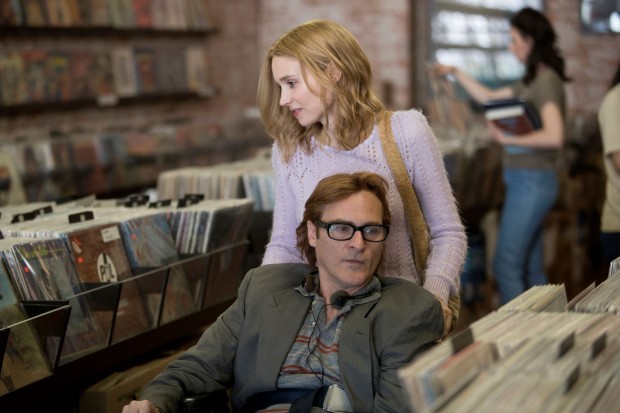
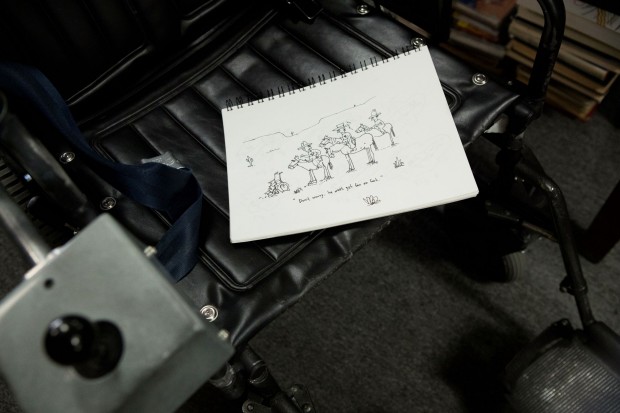
――あなたは絵を描きます?
ホアキン・フェニックス「描かない。ジョンの描き方はとても個性的で、手首ではなく肩から描くと本人が語っている。僕にとってはその動きが大変だったし、描くことが楽しいとは思えなかったよ」
――ガスは、アーティストは取り憑かれたような強迫観念を大なり小なり持っていて、ジョンは描き始めたら止まらなかったと語っていました。演じてみてそのように感じましたか?
ホアキン・フェニックス「そうだね、彼の本を読んでみるとわかるけど、何かにのめり込んでしまうような気持ちは理解できるよ。彼は小さい頃は絵を描いていて、事故の少し後からも漫画ではない絵を描いていたんだ。禁酒をしてシラフになってから、自分が変わり始めたということを突然火がついたように48時間も話していたりする。ある時、彼は漫画家であるということを自分で認識して、将来科学者たちが彼について研究するに違いないという冗談を言っていた。“これが漫画家の細胞”とね。細胞レベルで彼は漫画家なんだよ」
――それはあなたの仕事への向き合い方とも通じる?
ホアキン・フェニックス「まさにそう。まるで選択肢の余地がないという感じ。骨の髄にしみ込んでいるし、そういう風に感じることができるのは最高だよ。演じるということが僕にはそんな感じなんだ」
――人生の中でそう感じられることがあることはすごい。多くの人はそうではないですから。
ホアキン・フェニックス「うん、その通りだね」
――Do you draw?
Joaquin: I do not. No, I do not and the way that John drew was obviously really unique to him and he said that his drawing came from the shoulders more than the wrists. But it was a struggle for me and I never got to a place where I felt good about the drawing.
――Gus said that he thinks artists share an obsessional quality and that with John once he started drawing he couldn’t stop. Could you see that?
Joaquin: Yes, it’s in his book and when you read it I understood that feeling of what it was like when something is kind of taking over. He drew when he was a kid and he drew a little bit after the accident but he wasn’t cartooning and it wasn't until he got sober that things really started to change and he talks about this 48-hour period where it just suddenly clicked. He said he just knew at that point that he was a cartoonist and he had some joke that in the future a scientist would be studying him and he would say ‘these are the cells of a cartoonist.’ He felt that down to a cellular level he was a cartoonist.
――Can you relate to that obsessional feeling about your work?
Joaquin: I do, absolutely and I do feel like sometimes it feels you don’t have a choice. It’s just in your bones, it’s what you do and it’s the thing that satisfies you most and I feel that way about acting.
――That’s a wonderful thing to have in your life because a lot of people don’t have that…
Joaquin: It is.
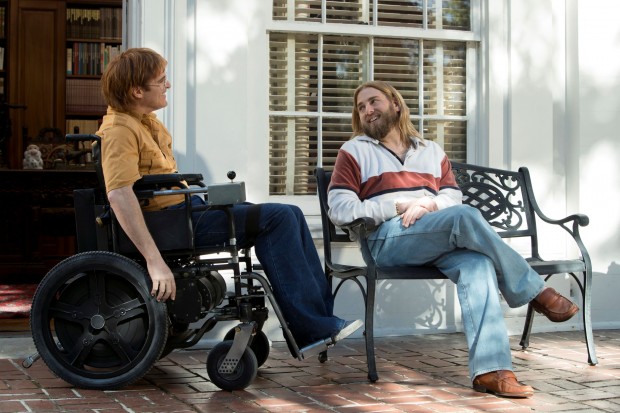
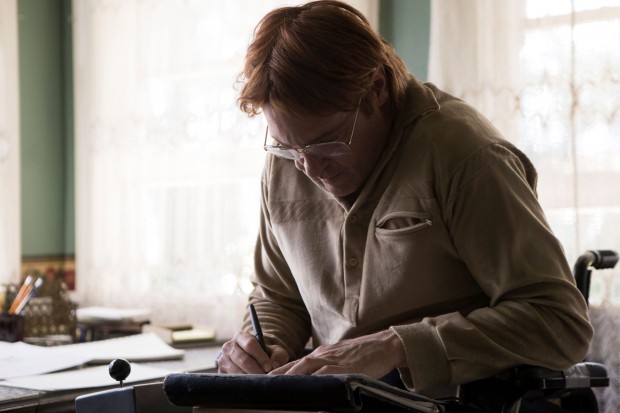
――あなたが19歳の時、『誘う女』(1995)で最初にガスと一緒に仕事をした時のことで、何か覚えていますか? 出演したことは俳優としての成長につながりましたか?
ホアキン・フェニックス「確かに成長に繋がったよ。(『誘う女』に出演する前)数年間は仕事をしていなかったんだ。子役として活動して、『誘う女』は僕にとって初めての“大人の役”で、ガスから多くのことを学んだし、俳優業の再開がこの作品だったことに感謝している。ガスの演出の方法はとてもユニークで繊細だから説明するのは難しいな。ジョナ(・ヒル)と僕はセットに座って、ガスが何をして、どうしたいのか、他の俳優たちにどのように接しているのかを見て理解していくような感じだった。だからそれがどういうことか説明できないんだ。『誘う女』で覚えているのは、リハーサルの時に僕自身何が起こったのか覚えていなくてとても困ったことがあった。どんなシーンかを思い出そうとしてもできずにいると、ガスに“何をしてもいいよ”と言われたんだ。“テーブルの上に立って、セリフを言ったっていい”と。“本当に?”と聞くと、“やってみて”とガスは言った。子役としてテレビの世界で育った僕には、そのシーンの必要条件を満たす予測装置みたいなものが頭の中にあって、そこに出てきたような演技をしようとしていたけど、脚本には書かれていない何かを見つけるという勘みたいなものはなかった。今の僕には理解できるけど、その当時はそういうことが全くわかってなかったんだ。ガスはそんな僕に啓示を与えてくれた。それは信じられないような瞬間で、僕はその時に開眼したんだと思う。セリフにばかり気を取られていたかつての僕は、部屋の中を見回して、これからはどこにでも行けると感じた。俳優としてそれは本当に重要なことだし、今でもそのやり方に挑戦している。ガスが俳優として大きく飛躍させてくれたんだ」
――なるほど。では障害を持ち、アルコール依存症と戦うジョンという役柄をどのように受け止めましたか?
ホアキン・フェニックス「いつも脚本を読んで、そのキャラクターの背景を考えながら役作りをしていくんだけど、ジョンは素晴らしい作家でありとても正直な人物だから彼の本を深く掘っていくのは本当に興味深い体験だった。彼の正直さに感謝したよ。彼の本を読んで、彼のプロセスを理解することができて本当に良かった。決まり文句やありきたりな説明ではなくそれをどう説明すればいいかわからないけど、彼はアルコール依存症を障害であると感じていた。でもその状況を受け入れた時に、イマジネーションがあふれ出して猛烈な勢いで漫画を描き始めた。僕はその部分が大好きだし、それが制作時に巻き起こる感覚だと思う。それがどんな感じかも理解できるし、パワフルで、深い感覚だ。反省、そして許容をアイデアにしていくのも好きだし、変わっていきたい、成長したい、なりえる最高の人になるという考え方も本当に好きなんだ。美しい考え方だし、僕も同じように感じ、他の人たちもそのように感じてくれることを願うよ。フィジカルな演技が好きだから、その行動を生む動機を理解することに挑戦して、やりがいも感じられた。彼のケガについて深く掘り下げていき、事故の後どのように対応していって、体が変化していき、どのように絵を描いていったのかを研究した。俳優にとってそれは夢なんだ。豊かな世界を探検するような感じだからね。前回ガスと仕事をした時は19歳くらいだったから、再び一緒に仕事をすることも本当に素敵だった」
―― What do you remember of working with Gus for the first time, back when you were 19 and made To Die For? Did it help shape you as an actor and put you on a certain path?
Joaquin: Yes, for sure. I hadn’t worked for several years. I’d worked as a child and To Die For was my first role as an adult and I’m so grateful that that was my reintroduction to making films because I learned so much from Gus. You know it’s hard to describe because he has such a unique approach to directing and it’s so subtle. Jonah (Hill) and I would sit around on set and we would try to figure out what Gus was doing, like how he was getting what he was getting from other actors, and it’s really hard to know what it is. I think part of it is I remember on To Die For we were rehearsing a scene and I can’t remember exactly what happened but I was struggling in some way, trying to figure the scene out and I couldn’t, and Gus said ‘well, you know you can do anything.’ And I was like ‘what do you mean?’ And he was like ‘well you could stand on the table and say the lines.’ I said ‘really?’ And he said ‘well, sure, you can try it..’ And I guess maybe because I had been a child actor and I had done TV and it’s so quick and there are these expectations of just fulfilling the requirement of the scene it had never occurred to me that there might be someth else that is not on the page that I could kind of uncover. Now it seems obvious to me but at the time it wasn’t and for the director to give you that allowance was revelatory for me. It was this incredible moment and suddenly the space completely opened and instead of feeling confined to this space with this mark saying this dialogue I suddenly looked around the room and I felt I could go anywhere. And I felt like that was really important, for me as an actor, and I still try to work in that way so he really helped shape the actor that I am.
――So what was it like to take on this role when you are portraying John’s disability and his battle with alcoholism?
Joaquin: Often you will have a script and you have to invent the back-story of the character so it’s really interesting delving into John’s book because he was a great writer and he was very honest. And I appreciate honesty in people. It was really nice to read his book and to hear his process. I don’t know how to say it without sounding clichéd and corny but for him he came to a place where he felt like his alcoholism was his disability and when he came to terms with that this flood of creativity came forth and he describes how he was just furiously cartooning. And I love that. I know the creative feeling. I know what that is like. It’s really powerful and profound. I love the idea of self-examination and I love the idea of forgiveness and of wanting to change and to grow and to be the best person that you can be. I thought they were beautiful ideas that I could identify with and I hoped that other people could, too. I do like physical things. I like physical roles and I like trying to take that on and I like trying to understand what motivates somebody’s movements so it’s really interesting to dig into his injury and then how he dealt with it after and how his body changed and how he drew. So you know, it’s a dream for an actor because there is so much and it’s such a rich world to explore. It was great and to work with Gus again was great because the last time I was about 19 years old.
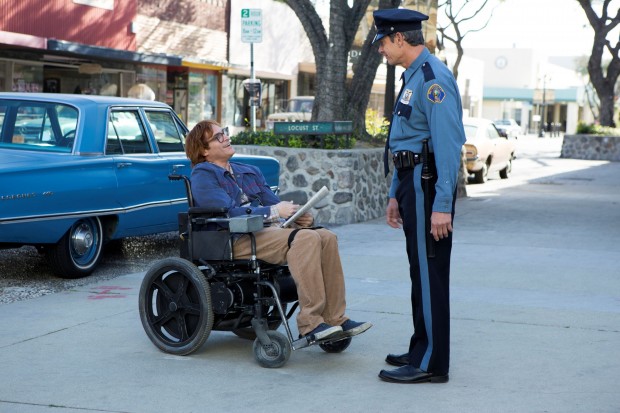
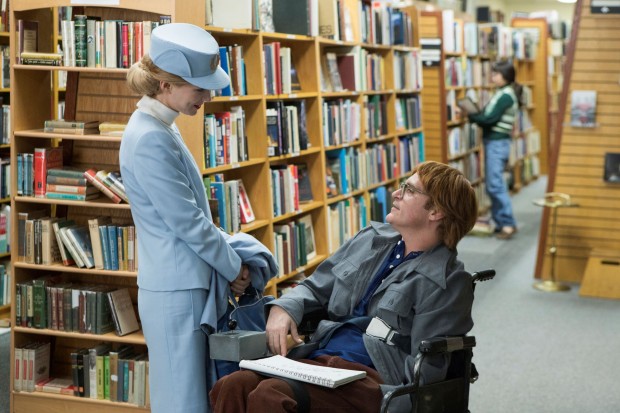
――個人的にも似ていると感じることはありましたか?
ホアキン・フェニックス「ジョンは(僕とは)とても違う経験をしてきたと思う。同じ経験を共有しているわけでもないし、同じように経験して理解する必要はない。何故なら僕たちはみんな何らかの形で、誰のようになるべきということに壁があるはずだ。人間はホールマークのカードのようにありきたりではないし、簡単に説明できない存在だ。
それが真実なんだ。不安定さ、疑い、恐れ、これらの感情はなりたい自分になることを邪魔してくる。人生の中で、あれこれやって、そして最終的には死を食い止めようとするだろ? それは正しいし、僕たち全員が心の奥底で思っていることだ。そしてそこに対して、みんなそれぞれ違う対処の方法を持っている。彼が本の中でどのように表現していたかは忘れてしまったけれども、じっと座って待つことはしなかったと語っていたと思う。困難にあった時の考え方は基本的にそれぞれの人の過去や感情から来ていると思う。ジョンは、彼の手が”あなたの人生の残りの時間を永遠に座って過ごしてください”と語っていると感じたそうだ。彼は座ることを強制されたと感じたと禁酒会で話していたと思う。そして、僕たちがどんなにちゃんと対処したとしても、そこにはもっと強力な何かがある……恐怖、心配、人生で避けたいこと、悪い感情……そして"逃げずに向きあうんだ"という強い気持ち。翼や解放を見つけるまでに、僕たちは悪い感情にとらえられてしまうことを心配する。彼も事故に遭って、最初はそうなってしまうことを心配したけれども、彼は自分を再発見し、変化し、解放がカタルシスとなって解決した、それはとても美しいことだよ」
――この映画が、最悪の事故を生き延びた男の話という、ありきたりなものになるかもということは考えませんでしたか?
ホアキン・フェニックス「ありきたりな伝記映画は作りたくなかった。伝記ものは嫌いだよ。ガスはとてもユニークな面を撮ろうとしていたから、ありきたりなものになるとは思わなかった。一番大事なことは、”作品は誠実か。製作陣は誠実か。誠実な表現をしようとしているか”
ということ。そもそもどれだけの映画が誠実さをもって作れられて、どれだけのことが誠実さをもって書かれていると思う? いつの日か題材が尽きて、淘汰され、誠実なものしか残らないと思うよ」
―― Could you relate to him in a personal way?
Joaquin: I felt like John had very different experiences (to me). I didn’t feel like we had a shared experience and I don’t think you would have had to have that experience to understand what it was like because I think we all, in some ways, have something that blocks us or prevents us from who we should be. It’s hard to talk about this without using clichés and sounding like a Hallmark card and I hate that. But it’s true, it’s like we all get caught up in our insecurities or our doubts and our fears, all these things that prevent us from being the most fully realised version of ourselves. So you can cruise though life and do this and that and try to kind of stave off death, right? That’s what it is right, that’s in the back of all of our minds that it’s coming to an end. And everybody has different ways of coping with that. And I can’t remember how he describes it in the book but he talks about not wanting to sit still, this idea of basically running from your past and your feelings, and he says it was like a hand went like ‘you know what, sit down and sit down forever, for the rest of your life.’ And he’s forced to just sit down and feel, which I think is maybe something from AA that he talked about. And there’s something really powerful about that because no matter what we deal with – and we all have our fears and concerns that we want to avoid in life, bad feelings – and there’s something very powerful about the idea of someone who is like ‘I can’t run away so I’m going to face this.’ and through that process finds their wings, finds their liberation, through what you or I might consider imprisonment in a sense and something that he considered his imprisonment at first, his accident, became the catalyst for his reinvention and his change and his liberation. And that’s beautiful.
―But were you afraid that the movie could also be clichéd in some way – a man finding himself through a terrible accident?
Joaquin: I was like ‘I don’t want to make a ****** biopic.’ I hate biopics. But Gus had a very unique take on and I didn’t think it would be like that. And sometimes you know the biggest thing is ‘is it honest? Are the people involved honest and are they trying to find honest expression?’ Because how many movies can you make and how many things can you write about? At some point you are going to run out of subjects and so you have to do something that is honest.
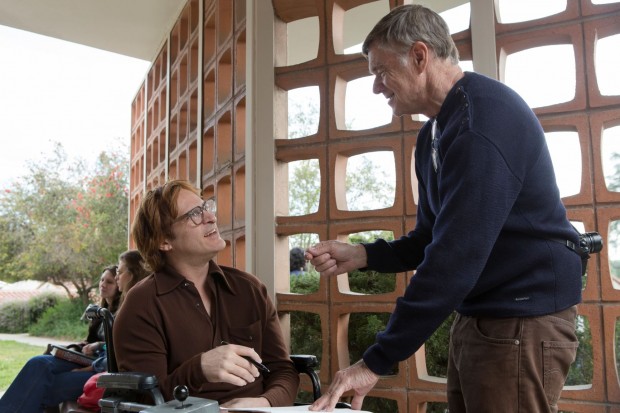
『ドント・ウォーリー』
公式サイト www.dontworry-movie.com
5月3日(金・祝)ヒューマントラストシネマ有楽町・
ヒューマントラストシネマ渋谷、新宿武蔵野館他全国順次公開
監督・脚本・編集:ガス・ヴァン・サント
出演:ホアキン・フェニックス、ジョナ・ヒル、ルーニー・マーラ、ジャック・ブラック
音楽:ダニー・エルフマン 原作:ジョン・キャラハン
原題:Don’t Worry, He Won’t Get Far on Foot
2018年/アメリカ/英語/115分/カラー/PG12
配給:東京テアトル 提供:東宝東和、東京テアトル
(C)2018 AMAZON CONTENT SERVICES LLC
関連記事のまとめはこちら
https://www.neol.jp/culture/
この記事に関連するニュース
-
「私たちを人間として扱ってほしい」やまぬ爆撃、家族との別れ…ガザ脱出の友人を探し記者がエジプトへ「戻りたいけど誰も戻れない」【脱出者が語る惨状】
北海道放送 / 2025年1月18日 9時45分
-
この英語ってどんな意味?「 plot twist 」
OTONA SALONE / 2025年1月11日 7時0分
-
英語で「それは大変だったね」はなんて言う?
OTONA SALONE / 2025年1月9日 7時0分
-
英語で「現実を受け止める」はなんて言う?
OTONA SALONE / 2025年1月7日 7時0分
-
この英語ってどんな意味?「Wake up and smell the coffee.」
OTONA SALONE / 2025年1月4日 7時0分
ランキング
-
1食習慣でも、運動不足でもない…免疫学者が「これだけは避けて」と言う免疫力がヨボヨボになる生活習慣
プレジデントオンライン / 2025年1月21日 17時15分
-
224年産米最高値に「非常にあり得ないこと」「健全な状態とは思っていない」 江藤農水相
産経ニュース / 2025年1月21日 12時49分
-
3「メニューしょぼくなりすぎ」「粉チーズ有料とか…」サイゼリヤ“不満噴出でも最高益”の矛盾のワケ
女子SPA! / 2025年1月18日 8時47分
-
4片頭痛の前兆・予兆とは? つらい痛みを和らげる方法
マイナビニュース / 2025年1月21日 11時0分
-
540歳から運動不足解消は何から始めたら良いの?
JIJICO / 2018年3月30日 7時30分
記事ミッション中・・・
記事にリアクションする
![]()
記事ミッション中・・・
記事にリアクションする

エラーが発生しました
ページを再読み込みして
ください



